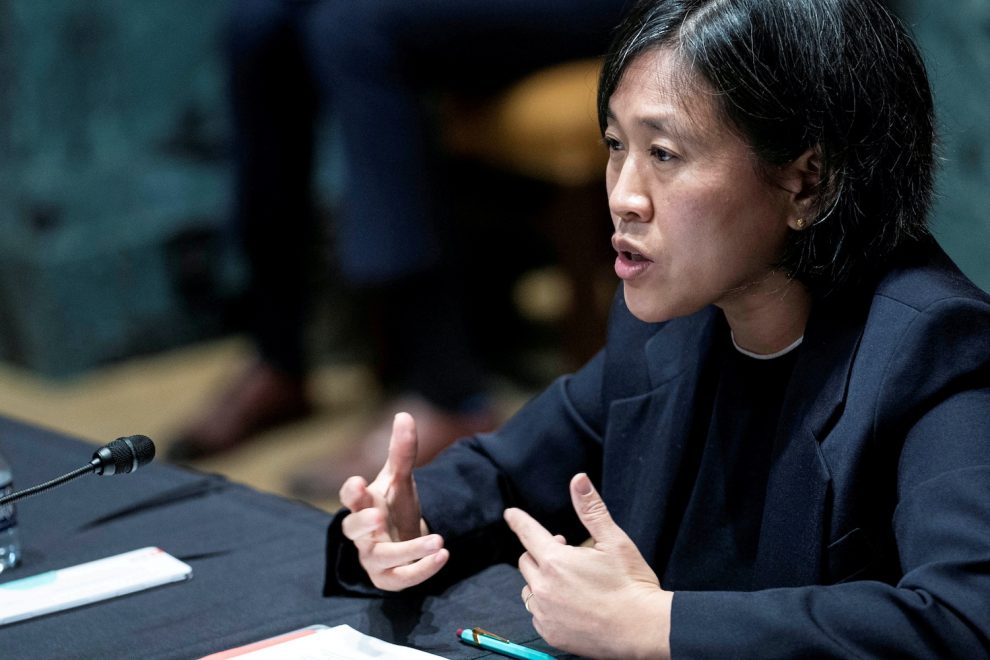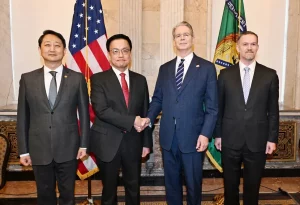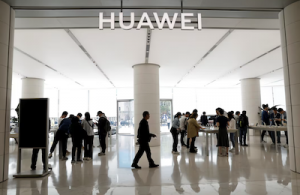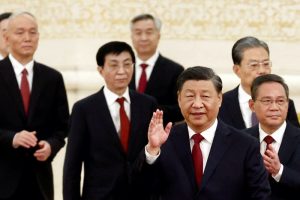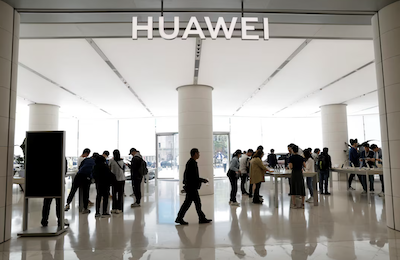US Trade Representative Katherine Tai is due to announce the Biden administration’s long-awaited China trade strategy on Monday, when she addresses a Washington think tank.
Tai will speak – at 10am EDT (1400 GMT) – about her review of China trade policy at the Center for Strategic Studies and participate in a question-and-answer section, her office said.
US President Joe Biden has kept in place tariffs on hundreds of billions of dollars of Chinese imposed imposed by his predecessor Donald Trump, but his officials have yet to reveal how it will address what they call China’s ‘non-market trade and subsidy practices’.
Tai has spent the past six months conducting a top-to-bottom review of the US’ China trade policy. She has said the United States faces “very large challenges” in its relationship with China that require engagement across the Biden government – and has asked Congress for new trade law tools to counteract massive Chinese state subsidies for high-tech sectors.
Other Biden administration officials say China has not met commitments made in the Phase 1 trade deal it signed with Trump in January 2019, which sought to ease the tariff war between the world’s two largest economies. The deal called for China to boost purchases of US farm and manufactured goods, plus energy and services by $200 billion over two years to the end of 2021 compared to 2017 levels.
Chad Bown, a senior fellow at the Peterson Institute for International Economics in Washington, estimates that China’s purchases of US exports through August are running at about 62% of the Phase 1 targets, based on US export data.
Tensions between the two economic powers have also grown as the US has restricted Chinese companies’ access to US sensitive technologies, such as telecommunications.
US AND EU CLOSER ON TRADE
Biden has sought to rally US allies to join Washington in confronting what it says are abusive trade policies by Beijing. Tai met with top European Union officials this week for the inaugural meeting of the Trade and Technology Council (TTC), which appeared to go a long way to repairing relations after they were damaged by Trump and his ‘America First’ outlook.
The talks were led on the US side by Blinken, Trade Rep Tai and Commerce Secretary Gina Raimondo, and on the European side by EU Executive Vice Presidents Margrethe Vestager and Valdis Dombrovskis.
They did not announce specific actions but mapped out key areas for 10 working groups to focus on before the next meeting, likely to be next spring in Europe, according to a European source who spoke to AFP.
Secretary of State Antony Blinken said the two sides enjoyed a “remarkable spirit of cooperation and collaboration”.
A fact sheet put out by Tai’s office on that get together gives a glimpse of issues likely to feature in Tai’s policy announcement on Monday.
The US and the EU are determined to address what they call “distortive trade practices” and the impacts of emerging technologies. But they also “intend to use our tools to protect workers and labour rights, combat forced and child labour, and consult on relevant trade, climate, and environmental issues”.
The worry for China is the new US policy will be one that is shared to a fair degree by Europe, if the principles agreed on at the TTC meeting in Washington, and outlined in the ‘fact sheet’ eventuate.
Key issues discussed with the EU included semiconductor supply chains, investment screening, export controls and artificial intelligence.
“The United States and European Union intend to exchange information on investment trends affecting security, including industry specific trends, origin of investments, and types of transactions, and on best practices with respect to analysing and addressing risk, with a focus on sensitive technologies and related sensitive data,” the USTR said.
The US and EU will cooperate on export controls and want to help “third countries to support multilateral export control regimes” and develop “convergent control approaches on sensitive dual-use technologies”.
In regard to artificial intelligence, the US and EU “will develop and implement AI systems that are innovative and trustworthy and that respect universal human rights and shared democratic values”. They want AI tech designed to “enhance privacy protections”, and will study the impact of AI on workers.
Raimondo has said the chip shortage is both an economic and a national security concern, and called for investments in domestic manufacturing in the European Union and United States.
CONTAINING CHINA
The US-EU communique did not mention China by name, but the world’s second-largest economy is omnipresent throughout, notably in the frequent mentions of concerns posed by “non-market economies.”
In addition to semiconductors, the sides are grappling with how to work together to counter what they view as China’s unfair trade practices.
The Biden administration so far has continued Trump’s strong line towards Beijing, keeping in place punitive duties on Chinese goods, as said, while the European Union has taken a less confrontational stance.
But the two groups pledged to work jointly and through reforms of the World Trade Organization (WTO).
“We stand together in continuing to protect our businesses, consumers, and workers from unfair trade practices, in particular those posed by non-market economies, that are undermining the world trading system,” their statement said.
But it also highlighted the need to keep tabs on investments in sensitive areas – something Washington did when it banned Huawei’s participation in the US advanced 5G cellular network – and control sensitive exports that could undermine national security.
China will be watching closely on Monday, of course, and is unlikely to be happy at the way things are playing out.
• Jim Pollard with Reuters and AFP.




